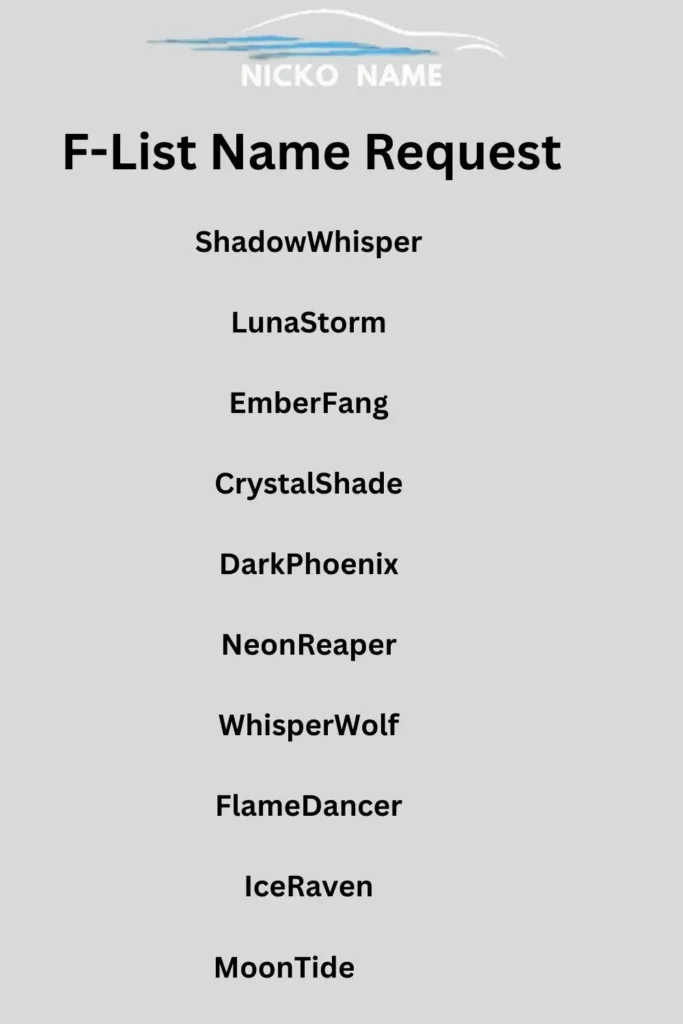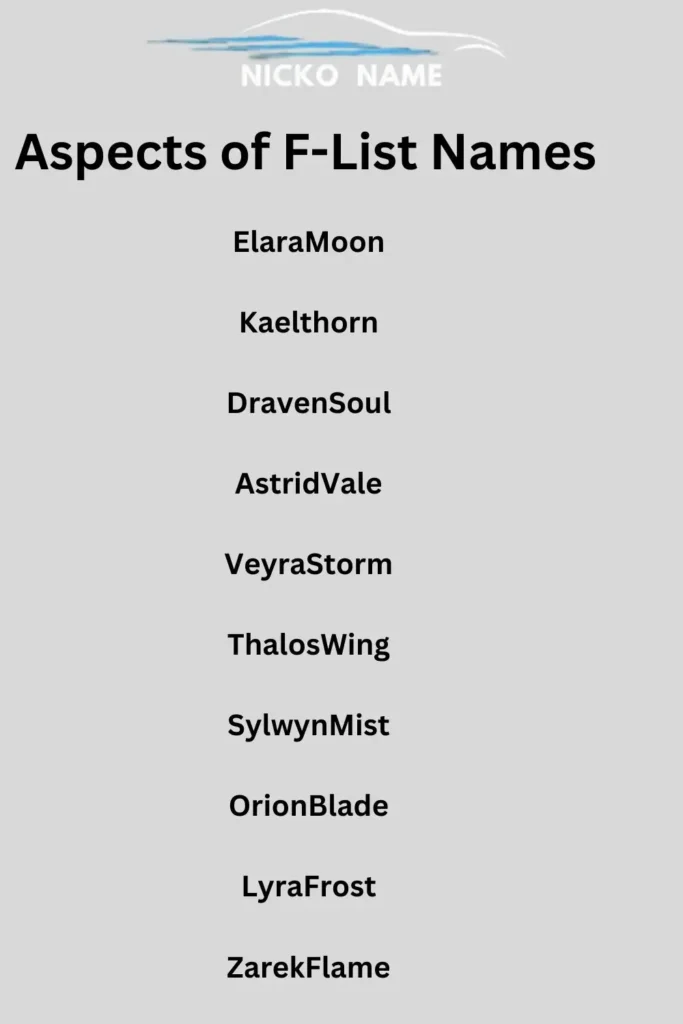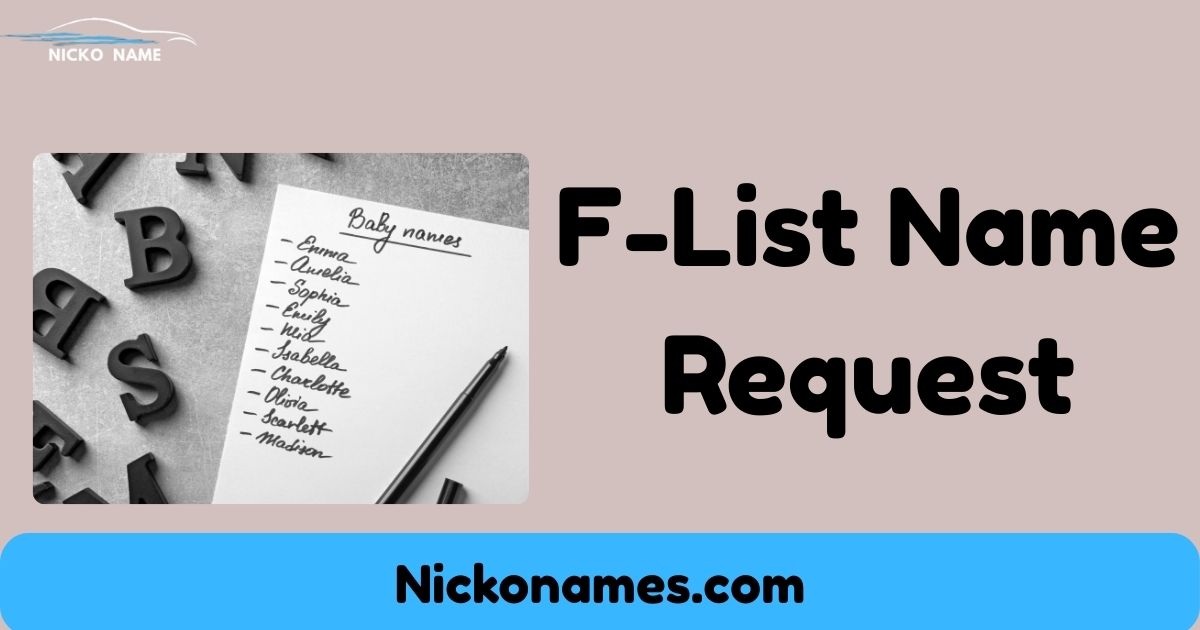The phrase “f-list name request” often comes up in online communities where users want creative, memorable, and sometimes role-specific names. Whether it’s for gaming, roleplay, or digital identity, choosing the right name matters. A name can reflect personality, theme, or simply add a fun twist to conversations.
In this guide, you’ll learn everything about f-list name requests how they work, why they matter, and how to generate names that truly stand out.
Also Check out: 150+ Best Bible Nickname
What is an F-List Name Request?
An f-list name request is essentially a way for users to ask for suggestions or generate names for their profiles, characters, or accounts. These names are not random they’re often linked to identity, creativity, and personal branding. Some people want humorous names, while others prefer fantasy, edgy, or professional-sounding ones. The goal is to strike the balance between uniqueness and relevance.
- ShadowWhisper
- LunaStorm
- EmberFang
- CrystalShade
- DarkPhoenix
- NeonReaper
- WhisperWolf
- FlameDancer
- IceRaven
- MoonTide

- StormBreaker
- VenomHeart
- CyberDrift
- RavenWing
- NightFlame
Linguistic and Conceptual Aspects of F-List Names
From a linguistic perspective, names in f-list requests are shaped by semantics, connotations, and cultural references. Some users look for names with deep meaning, while others just want something catchy.
- Semantically relevant terms: fantasy, roleplay, avatar, username, alias, identity.
- Lexical terms: short, easy-to-type, phonetic clarity.
- Polysemy: a single name can hold multiple meanings. Example: “Raven” could symbolize darkness, intelligence, or mystery.
- ElaraMoon
- Kaelthorn
- DravenSoul
- AstridVale
- VeyraStorm
- ThalosWing
- SylwynMist
- OrionBlade
- LyraFrost
- ZarekFlame

- FaelanDark
- SeraphinaDusk
- KyrionAsh
- VeylunShadow
- CalistaNight
Categories and Variations of F-List Name Requests
F-list names often fall into categories based on their hypernyms and hyponyms:
- Hyponyms (specific names): “IceWolf,” “DarkHunter,” “StarGazer.”
- Hypernyms (broader category): fantasy names, gamer tags, roleplay aliases.
- Holonyms & Meronyms: names as parts of character identity (e.g., “StormBringer” part of a fantasy warrior profile).
- Synonyms & Antonyms: names like “LightBringer” (synonym for hope) vs “DarkSlayer” (antonymic twist).
- HexBreaker
- IronFang
- VenomSoul
- CyberWraith
- BloodRider
- StormRazor
- PhantomAsh
- ShadowCircuit
- BladeZero
- ToxicFlare
- GrimLock
- EmberScythe
- VortexShade
- SkullRender
- NightPulse
Contextual Associations and Perceptions
Names carry collocations and connotations that affect how they’re perceived:
- Collocations: “Dark + Flame,” “Ice + Shadow,” “Storm + Rider.”
- Connotations: positive (guardian, light, protector) vs negative (demon, venom, shadow).
- Semantically related entities: gaming communities, roleplay sites, online forums.
- SirGiggles
- MuffinSlayer
- PickleNinja
- ToastWizard
- BananaKnight
- CheekyGoblin
- SpaghettiWarrior
- PotatoMage
- CaptainQuack
- DonutCrusher
- FarticusMaximus
- WaffleBeard
- JellyfishPunch
- TofuDragon
- NoodleKnight
Attributes and Characteristics of F-List Names
When users make a name request, they often look for names with distinct attributes:
- Common attributes: short, catchy, easy-to-remember.
- Rare attributes: culturally inspired names, ancient linguistic roots, or abstract meanings.
- Unique attributes: names created with symbolic wordplay or mashups.
- Voxara
- Elyndor
- Zephyros
- Thalorien
- Crysera
- Voralis
- Aevira
- Kytheron
- Lythora
- Solyric
- Elandros
- Mystara
- Caelthys
- Onyric
- Vaeloria
Practical Applications of F-List Name Requests
F-list names are used across multiple spaces:
- Gaming: usernames, guild identities, PvP tags.
- Roleplay: fantasy characters, story-driven profiles.
- Social Media: alternative accounts, anonymous profiles.
- Creative Projects: writing, art signatures, brand names.
- PixelSlayer
- GameGlitcher
- LevelUpGhost
- LootBandit
- XPStorm
- QuestBreaker
- ManaReaper
- NoobHunter
- PixelKnight
- RaidCrusher
- CritWizard
- RespawnDemon
- BuffGoblin
- LagDestroyer
- BossRider
Case Study: Why Names Influence Digital Identity
Research in digital psychology shows that usernames impact perception. In one study, players with intimidating names (e.g., “BloodSlayer”) were perceived as more competitive, while those with humorous names (like “MuffinMage”) created more positive interactions. This highlights why people carefully request names they want to shape how others perceive them.
Final Thoughts
The f-list name request isn’t just about making up random words. It’s about finding an identity that resonates with your personality, story, or digital presence. A great name balances meaning, memorability, and creativity. Whether you’re stepping into a fantasy RPG, joining an online community, or just looking for something fun, the right name can make all the difference.
FAQs About F-List Name Requests
What is an f-list name request?
A way for users to ask for unique, creative names for gaming, roleplay, or online identity.
How do I create a good f-list name?
Keep it short, meaningful, and aligned with your personality or theme.
Can I use f-list names outside roleplay?
Yes, they work for gaming, writing, and even social media aliases.
What makes a name stand out?
Originality, connotation, and memorability.
Should I use random generators or ask for suggestions?
Both can help, but manual creativity often produces the best results.

